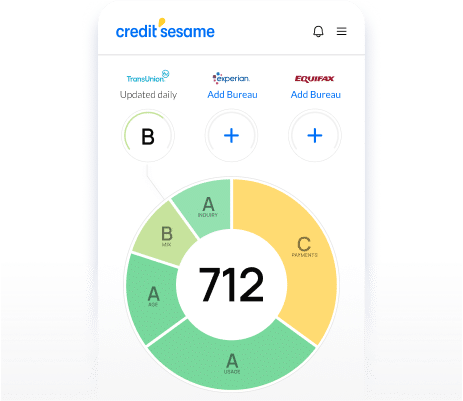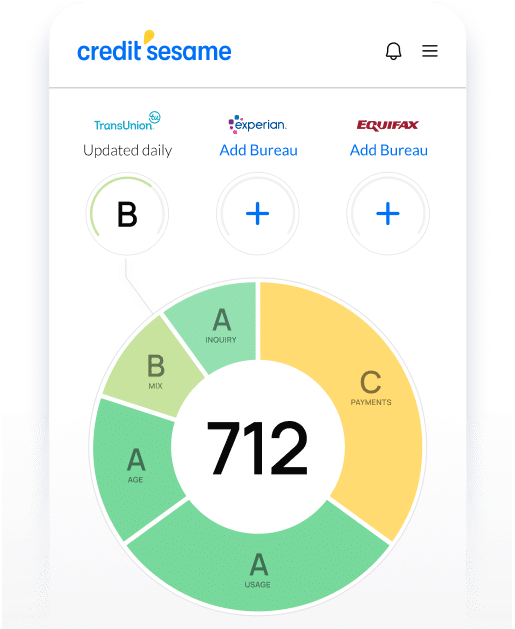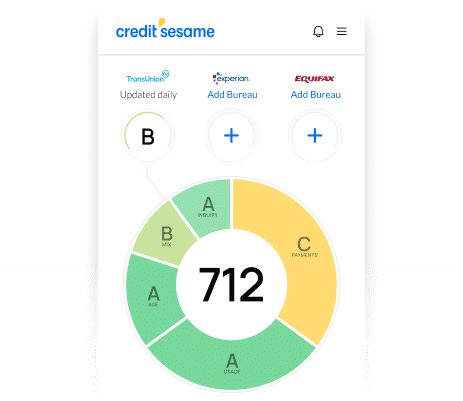What is a good credit score
A good credit score is a crucial aspect of personal finance. It significantly affects various financial opportunities and is key in determining creditworthiness. Understanding what constitutes a “good” credit score is vital for making informed financial decisions.

Get your free credit score
Start today. The sooner you know your baseline score, the sooner you can start to build credit history.
By clicking on the button above, you agree to the Credit Sesame Terms of Use and Privacy Policy.
How credit scores work
A credit score is a three-digit number that summarizes how much of a risk it is to lend you money. There are different credit scores, but the FICO score is often used.
FICO scores range from 350 to 850. The higher your credit score, the more trustworthy credit lenders consider you to be.
Banks, credit card companies and lenders of all kinds use credit scores in several ways. They may use them to indicate whether someone is likely to qualify for a credit. They may also use them to decide how much interest to charge on credit.
The most basic thing a lender wants to know about a potential customer is how likely they are to repay the money they borrow. A credit score gives them a snapshot of this. A lender may want more information, such as the details available on a credit report. However, before they dive into that much detail, a credit score gives them an initial indication of whether it will be worth the effort.
Credit reports and credit scores are different things, though they are related. A credit report is a detailed record of your financial history. It contains several details a lender would want to know about how you’ve used credit in the past and how you’re using it now. These details can indicate whether it’s likely worth the risk of lending you money.
A credit score boils down that risk assessment to a single number. Think of it like the grade on a test. Your answers to individual questions may provide more detail about what you do and don’t know, but the grade sums up how you did overall.
In the case of a credit score, what is that grade based on? The sections below explain five things that go into determining your credit score.
1. Payment history
This is the largest single factor in determining your credit score.
Payment history considers how often you’ve used credit and how often you have missed or been late with a payment. Only payments that are 30 days overdue are considered late.
A late payment can stay on your credit report for up to seven years. This is likely to drag down your credit score. However, the more recent a late payment is, the more it matters.
Being on time with payments and using credit regularly is important. That’s how you build a successful payment history that will reflect positively on your credit score.
2. Credit utilization
A creditor is wary of someone who looks overextended with too much debt. That’s why credit utilization is part of what determines a credit score.
Credit utilization looks at how much debt you have in a few different ways. These include how much you owe, how many of your credit accounts have amounts owed on them, and what percentage of your available credit you’re currently using.
3. Age of accounts
The longer you’ve been using credit successfully, the more of a track record you have. That’s why the age of your credit accounts is one of the things that goes into determining your credit score.
The age of your credit accounts is measured in a few different ways. The age of your oldest and newest accounts are included. So is the average age of all your credit accounts. In each case, the older your accounts, the more it helps your credit score.
4. Mix of credit
There are two basic types of credit accounts: revolving and non-revolving.
Revolving credit includes things like credit cards and home equity lines of credit. This is credit with no schedule for when you access it and pay it back in full. It’s considered “revolving” because old balances may be paid down and new ones built up repeatedly.
Non-revolving credit is credit provided in a set amount and with a fixed schedule for repayment. This includes most types of loans, such as mortgages, auto, student, and personal loans.
Creditors like to see that you can handle both types of credit. So, having a mix of both revolving and non-revolving credit can help your credit score.
5. New credit activity
If it looks like you’ve just borrowed a lot of new money or are getting ready to, lenders might consider it a bigger risk to extend you any additional credit.
So, recently-opened accounts may detract from your credit score. Even applying for credit, which often creates a record of your credit being checked, may hurt your score.
Notice that things like income and net worth don’t go into calculating a credit score. The score is based purely on your use of credit. Other financial characteristics don’t affect credit scores, though they may influence a lender’s decisions.
Knowing what goes into a credit score is the first step to getting a good score. It helps you focus on things that will help improve your score.
What is a good credit score?
Once all those things are factored into your credit score, what’s considered a good result?
Credit scores can be anywhere in the range of 300 to 850. According to the Fair Isaac Corporation (FICO), which created the FICO score, here’s how different ranges of credit scores are viewed, from bad to excellent:
| Score Range | Category | What it Means |
|---|---|---|
| 800 to 850 | Exceptional | Scores in this range are considered to be outstanding. This means you’ve used credit extensively and have a consistent track record of making your payments on time. Lenders will likely be eager to give you credit on their best terms. |
| 740 to 799 | Very Good | Scores in this range are clearly above average. You have a strong record of using credit successfully in the past. Just about any lender will likely let you have credit, though you still may not qualify for the best terms. |
| 670 to 739 | Good | Scores in this range are either a little above or a little below average. That’s enough for most lenders to give you credit, though you probably won’t qualify for the best deals. |
| 580 to 669 | Fair | Scores in this range are still below average, suggesting that you’ve had mixed experiences with using credit in the past. Some lenders might give you credit, but not on favorable terms. |
| 300 to 579 | Poor | Scores in this range are well below average. That’s either because you’ve had problems with credit in the past or insufficient information is available to form a good credit score. In either case, most lenders would be unlikely to give you credit. |
Another way to look at the question of what is a good credit score is to compare yourself to other consumers.
- Below 600 would mean you are in the bottom 15% of credit users. That means 85% of other consumers have a better credit score than you. As a result, you’d be far down on the list of people lenders would want to do business with.
- 600 to 699 is a little better, but it still means nearly two-thirds of consumers have a better credit score than you do.
- 700 to 749 are slightly below or slightly above the national average.
- 750 to 799 is clearly above average but still not elite.
- Above 800 puts you in the top quarter of all consumers.
These peer group standards matter because lenders are more willing to lend under good economic conditions. They may become much more selective when the economy is bad. So, there’s no set credit score that will guarantee you credit. However, if your score is in the top tier of all credit scores, you can count yourself among the most likely to get credit under any conditions.
Why does a good credit score matter?
Just as some students care more about their grades than others, some consumers care more about their credit scores than others.
That’s a personal choice, but before you decide how seriously to take your credit score, you should consider how it can affect you.
Access to credit
Credit can mean a lot to a consumer’s lifestyle. From the convenience of having a credit card to being able to afford large purchases like a house or a car, qualifying for credit makes all the difference.
That’s been the case for decades, but it’s more important than ever now. Online shopping generally relies on some form of credit, and more and more in-person shopping and entertainment use cashless payments.
A good credit score helps ensure that you can take advantage of these conveniences.
The cost of credit
Lenders price their products depending on how risky they think the borrower is.
For example, if you look at a credit card ad, you’ll likely see the interest rate offered as “16.99% to 26.99% APR.” This means there’s a 10% difference between the interest rate offered to customers with the best credit and the rate available to those who just barely qualify for the card. People with mediocre or poor credit pay much more than those with strong credit scores.
It works the same way for most loans. If you borrow to buy a car or a house, you’ll likely get a better interest rate if you have excellent credit. Over the lifetime of a car loan, that can add up to thousands of dollars in savings or tens of thousands on a mortgage.
Other uses of credit scores
Your credit score may be used to evaluate you in other ways.
Employers increasingly use credit scores and credit reports as part of their background checks. They want to see if you’ve been responsible with your financial affairs. They also want to be aware of any money problems that could be distracting.
If you go to rent an apartment, you may find that the landlord wants to check your credit. After all, a landlord wants to ensure they are paid on time, just like a lender.
Credit scores may also be used to set insurance rates. While this practice is controversial and not allowed in all states, studies have shown that people with poor credit are more likely to file insurance claims. That makes insurance companies want to charge them more for coverage.


In a nutshell
Having good credit doesn't necessarily take a lot of hard work. It's more about developing good habits. The more you know about what can help or hurt your credit score, the easier it is to develop the habits that lead to a good credit score.
Don't wait till you need credit to worry about your credit score. Building a good credit record takes time. Be aware of your credit score and work to maintain a good score at all times. You never know when you might need it or when someone is making decisions about you based on it.
Share this
More related articles

Check your credit score for FREE
Checking your score to see where you stand is FREE and does not impact your credit.
What is a credit score
How to check credit score
Understanding credit score
See your score.
Reach your goals.
See your score. Reach your goals.
Begin your financial journey with Credit Sesame today.
Get your FREE credit score in seconds.
By clicking on the button above, you agree to the Credit Sesame Terms of Use and Privacy Policy.
















